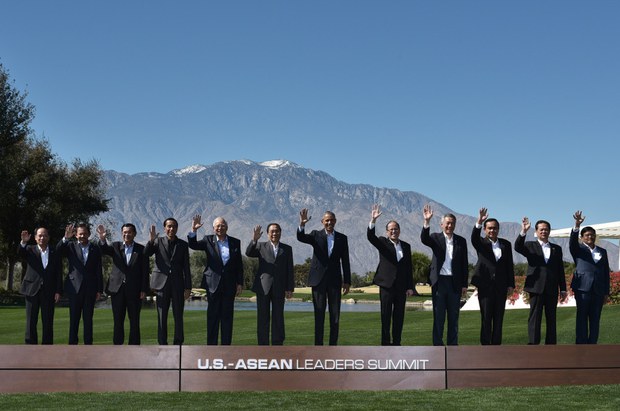ASEAN, US Vow Joint Action on Security, Prosperity
2016.02.16
 American President Barack Obama and Southeast Asian leaders take part in a group photo ending the U.S.-ASEAN Leaders’ Summit at the Sunnylands estate in Rancho Mirage, Calif., Feb. 16, 2016.
American President Barack Obama and Southeast Asian leaders take part in a group photo ending the U.S.-ASEAN Leaders’ Summit at the Sunnylands estate in Rancho Mirage, Calif., Feb. 16, 2016.
Updated at 7:46 p.m. ET on 2016-02-16
The United States and ASEAN nations Tuesday closed a two-day summit with sweeping commitments to boost maritime security and economic activity in the region and limit the flow of Southeast Asian militants to Islamic State-controlled territory in the Middle East.
A joint statement issued at the end of the gathering at the picture-perfect Sunnylands estate in California appeared to refer to the dispute over the South China Sea, amid fears that China is aiming to control key resources and maritime routes in the region.
The U.S. and 10 members of the Association of Southeast Asian Nations (ASEAN) affirmed a commitment to “ensuring maritime security and safety, including the rights of freedom of navigation and overflight and other lawful uses of the seas, and unimpeded lawful maritime commerce,” as well as “to address common challenges in the maritime domain.”
Asked earlier in the day if the summit would deliver a joint statement on the South China Sea, U.S. Secretary of State John Kerry replied affirmatively, although the statement did not mention China or the sea by name.
"We discussed the need for tangible steps in the South China Sea to lower tensions including a halt to further reclamation, new construction and militarization of disputed areas," U.S. President Barack Obama told reporters following the summit, according to Reuters.
China and four ASEAN states – Malaysia, Brunei, the Philippines and Vietnam – have overlapping claims in the South China Sea that the U.S. wants resolved peacefully.
Countering extremism
The “Sunnylands Declaration” pledged that the region would “lead on global issues such as terrorism and violent extremism” as well as in combatting trafficking in people, drugs, wildlife and timber, and illegal fishing practices.
The leaders agreed to make better use of Interpol data to prevent the flow of fighters across borders, Reuters reported.
Hundreds of Indonesians and Malaysians have gone to Syria and Iraq to fight with the Islamic State. According to recent reports, IS leaders have officially recognized pledges of allegiance from militant groups in the southern Philippines.
Opening the summit Monday, Obama cited the deadly attack in Indonesia’s capital last month by IS-linked militants, saying “the scourge of terrorism demands that we stay vigilant, share more information and work cooperatively to protect our people.”
At Obama’s request, Indonesia President Joko Widodo was asked to lead a discussion on countering radicalism and terrorism at the gathering.
Indonesia was chosen to the lead the discussion because other countries were impressed with the government’s policy in dealing with the problem, Foreign Minister Retno L.P. Marsudi said.
“The approaches taken by the President of Indonesia to handle the terror attack on 14 January is really appreciated by the international [community],” Retno said in a statement issued by the Indonesian cabinet on Sunday.
Call for civilian rule in Thailand
The summit also touted the importance of “dynamic, open and competitive economies” and inclusive economic growth, as well as the strengthening of democracy, in a region of yawning economic disparities and uneven political freedoms.
"We continue to encourage a return to civilian rule in Thailand," Obama told a press conference after the summit, according to AFP.
Obama also said the gathering agreed to work toward reforms that would enable all ASEAN members to join the Trans-Pacific Partnership (TPP), a vast free-trade pact between the U.S., Brunei, Malaysia, Singapore, Vietnam, and seven non-ASEAN nations.
The U.S. said it would open the offices in Jakarta, Bangkok and Singapore specifically aimed at increasing US economic engagement in the region, according to AFP.
ASEAN is the fourth-largest trading partner of the United States, which is competing with China for economic influence in the region.
‘A long way to go’
The summit in Rancho Mirage, Calif., was the first ever held in the United States between the 10 Southeast Asian leaders and an American president since the two sides forged diplomatic relations four decades ago.
Obama, who is in the last year of his presidency, spoke about how ASEAN was at the heart of his strategy to bring about a strategic “re-balancing” – the so-called Asia pivot – in American foreign policy.
Malaysian Prime Minister Najib Razak and Thai Prime Minister Prayuth Chan-o-cha were among the other the ASEAN leaders at the summit.
It unfolded amid criticism from rights activists that the U.S. was hosting Asian leaders with dubious records on human rights and democracy.
Vietnam and Laos are one-party communist states while Cambodian Prime Minister Hun Sen, who has been in power for more than three decades, dominates all centers of power in his country.
Thailand is run by a junta that seized power two years ago. In neighboring Malaysia, Najib’s government has been beleaguered with a financial scandal connected with the 1MDB state investment fund, whose advisory board he chairs.
Hundreds of protesters from rights and other groups had gathered outside the summit to highlight rights abuses in the region and oppose the TPP.
U.S. National Security Adviser Susan Rice addressed the issue in briefing the press at Sunnylands before the summit opened on Monday.
“We’re quite aware that some of our ASEAN partners have a long way to go on human rights,” Rice told reporters, according to a transcript released by the White House.
“But the United States will continue, as we do everywhere, to stand up for the rights of all people,” she said, adding that President Obama during the summit would “stress the importance of good governance, the rule of law, human rights, and a vibrant civil society, and capable, accountable institutions.”







